Can You Take Tylenol Before A Tattoo Session?
Discover whether Tylenol can better your pain tolerance for a fuss-free tattooing session.

Image: Shutterstock
If you are considering getting a new tattoo, you may be no stranger to the fact that a bit of pain is part of the process. Some tattoo lovers suggest popping painkillers like Tylenol before tattoos to solve this problem. This medication is a brand name for a popular over-the-counter pain reliever and fever reducer. The main ingredient in it is acetaminophen, which is commonly known as paracetamol, and is often used to relieve mild to moderate pain for common problems like menstrual pain, toothaches, sore throat, and headaches (1). However, if you are wondering whether Tylenol can help with tattoo pain, you are in the right place. This article will help you discover all about the role of Tylenol in tattoo pain management, the many types available in the market as well as possible adverse reactions related to its consumption. Keep reading to make an informed decision before getting your permanent tattoo.

In This Article
Can You Take Tylenol Before A Tattoo Session?

It is generally considered safe to take acetaminophen medications like Tylenol for pain relief before your tattoo session. This is because, unlike other painkillers, such as aspirin and Ibuprofen, it is not a blood thinner. Medications that are considered blood thinners significantly inhibit platelet aggregation, which is the process of blood platelets sticking together to form a clot. This means blood thinners delay this blood clot formation, which prolongs the bleeding time (2), (3). As normal blood clotting is essential during the tattooing process, taking them before getting inked may be risky.
However, since Tylenol helps with pain relief without such effects on the blood clotting time, tattoo artists consider taking it a safe choice. However, before you decide to pop this pill for your tattoo appointment, here are some considerations you should keep in mind:
- Consider taking it half an hour to an hour before your appointment time to give the medication some room to start its work.
- Follow the recommended dosage instructions on the packaging, or as directed by your healthcare provider or licensed tattoo artist.
- Currently, the manufacturer recommended acetaminophen dosage per day is between 3-3.25 grams (1). Avoid exceeding this limit.
- Ensure that you are not allergic to acetaminophen or any of the ingredients in Tylenol. If you have never had the medication before, avoid the risk of taking it for the first time just before your tattoo session.
- Avoid taking the medication after drinking alcoholic beverages, as this may increase the risk of liver damage (4).
Alongside these pointers, always check the Tylenol product you are taking for ingredients like aspartame. This is an artificial sweetener that converts to an amino acid called phenylalanine in the body, which at an excess may cause brain damage. This makes it unsuitable for people with phenylketonuria, a genetic disorder that increases the levels of this amino acid in the blood, leading to developmental issues in newborns (5). It is also important to note that Tylenol is only meant for mild to moderate pain. However, you may even experience extreme pain during your tattoo procedure, depending on your pain threshold, the. Therefore, the medication may not help you with a complete pain-free tattooing session.
Kristen, a blogger, shared that she experienced minimal pain during her first tattooing experience after taking Tylenol. She writes in one of her posts, “I’m not sure if it was God answering my prayers, the two extra-strength Tylenol I took an hour beforehand, or the fact it just isn’t so bad… but the smallest one did not hurt in the least, and the second and slightly larger one just had an annoying dragging feeling here and there…(i)”
 Quick Tip
Quick TipThere is no direct evidence suggesting that taking Tylenol before tattoos may have any adverse side effects. However, the medication has some side effects in general that may affect your ink session. Scroll down to learn about them.
Key Takeaways
- It is generally considered safe to take Tylenol for pain relief before your tattoo session, as it does not delay blood clot formation or prolong the bleeding time.
- You may take it an hour before your appointment and should avoid exceeding the daily recommended acetaminophen dosage of 3-3.25 grams, as its overuse may lead to adverse effects like liver damage.
- Tylenol may also cause allergic reactions and lead to gastric problems like nausea and stomach pain that may make you uncomfortable during the tattooing process.
- You may also opt for numbing agents and basic meditation techniques in case you are not inclined to taking Tylenol for tattoo pain management.
Side Effects Of Taking Tylenol Before A Tattoo Session
Tylenol is generally considered safe before getting a tattoo when used as directed However, it is important to be aware of its potential side effects. Here are some of them:
- May Lead To Allergic Reactions

If you are allergic to acetaminophen, you may experience allergic reactions, such as skin rash, severe dizziness, itching, swelling, and difficulty breathing (6). You can easily avoid this by visiting your doctor for an allergy test prior to taking Tylenol.
- May Interact With Other Medications
Tylenol may interact with other medications like warfarin, an oral anticoagulant used to treat and prevent blood clots. Some individuals believe that acetaminophen may increase the blood-thinning abilities of warfarin. However, more research is needed to understand this concern (7). Therefore, it is recommended that if you are on any other medication, always consult your healthcare provider before taking Tylenol.
- May Cause Gastrointestinal Problems

Some people might experience gastrointestinal side effects such as nausea, constipation, vomiting, and abdominal pain after taking Tylenol (1). This may increase your discomfort during the tattooing process, leading to excess movement and difficulty for the tattoo artist.
- May Result In Overdose
Taking more than the recommended dosage of Tylenol may result in problems like liver damage and increased blood sugar levels (1). In rare cases, taking too much Tylenol may also lead to a low blood platelet count, which may result in easy bruising or bleeding during the inking process (8).
 Did You Know?
Did You Know?It is important to follow the recommended dosage instructions and consult with a healthcare professional to avoid these side effects of taking Tylenol before getting tattoos. But what about taking it after tattooing procedures? Learn about it in the following section.
Can You Take Tylenol After A Tattoo Session?

In general, it is safe to take Tylenol after getting a tattoo for pain relief. However, if you wish to take the medication to treat after-tattoo inflammation, it may not be the best option. This is because, research suggests that acetaminophen lacks anti-inflammatory properties (1). Ideally, it is best to consult your tattoo artist or healthcare expert before taking Tylenol or any pain reliever for tattoo soreness and pain. Also, if you decide to pop a Tylenol, ensure to follow safety precautions like not mixing it with alcohol and taking only the recommended dosage to avoid side effects.
Additionally, your tattoo artist will provide you with ways to calm your inflamed sensitive skin post the session, and you should diligently follow these tattoo aftercare guidelines to speed up the healing process and reduce the pain.
While taking Tylenol for tattoo pain, it is important to know that the medication is available in various forms and types. The following section will give you a brief overview of them.
Types Of Tylenol For Relieving Tattoo Pain
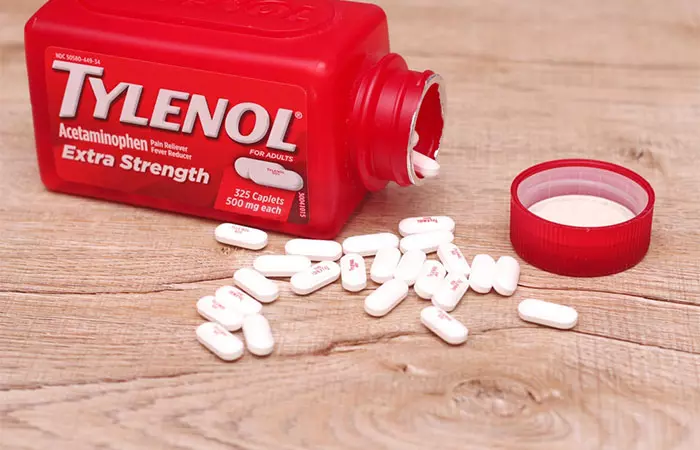
Tylenol comes in various forms, like regular tablets, gel capsules, orally disintegrating tablets, and solutions. You may choose a form depending on your preference and ease of absorption. For instance, if you are someone who faces difficulties gulping their tablet medication with water, you may opt for orally disintegrating tablets that melt easily on the tongue. You should also know about the following Tylenol types available in the market:
- Regular Strength Tylenol: It generally contains 325 milligrams of acetaminophen per tablet or capsule, and is ideal for mild to moderate pain and fever. You may swallow it with a glass of water.
- Extra Strength Tylenol: It generally contains 500 milligrams of acetaminophen per tablet and provides a higher dose for more effective pain relief and fever reduction. Like regular strength tablets, you may also swallow it with a glass of water.
- Tylenol Rapid Release Gels: it is formulated for faster pain relief and is available in a variety of strengths. You may gulp it with plain water for quick relief from pain, fever, and headache.
- Tylenol Dissolving Tablets Or Powder: It is generally available in 500 milligrams strength and is formulated to dissolve on your tongue in seconds without any water.
Experiencing pain during tattooing procedures is sort of a rite of passage. But, ultimately, the decision to take Tylenol before visiting the tattoo shop is your own. This decision depends on various factors like your medical history, and pain tolerance. While the medication is generally safe for consumption compared to other painkillers, like ibuprofen, it is still important to consult with a medical professional, especially for pre-existing medical conditions, like high blood pressure and diabetes, and the risk of potential interactions with other medications. If you do decide to go ahead with it, ensure that you consume it only at a safe dosage and let your tattoo artist know. It’s crucial to take your time and learn how to prepare for a tattoo session. Equally important is to have a conversation with a tattoo artist about managing pain, including whether taking Tylenol is a suitable option. This will ensure you’re well-informed and prepared for your session.
Frequently Asked Questions
Can I take Tylenol with orange juice?
Generally, it is recommended to take Tylenol with plain water. However, you may take it with non-alcoholic beverages like orange juice, as there are no known adverse effects linked with it.
Can I take Tylenol before tattoo removal?
Yes. Anecdotal evidence suggests that it is generally safe to take Tylenol before tattoo removal procedures, such as laser treatment, to manage pain. However, it is important to consult with your healthcare provider before doing so.
Should I eat before getting a tattoo?
Yes, having a good meal beforehand is important. It keeps your energy up and helps you handle pain better, reducing the chances of feeling lightheaded during the session. You can also take a few snacks with you to your tattooing session if you are getting a large or intricate design.
Illustration: Can You Take Tylenol Before A Tattoo Session?

Image: Stable Diffusion/StyleCraze Design Team
Pain is an inevitable part of the tattooing process, and it may vary depending on factors such as the individual’s pain tolerance and the tattoo design, size, and location. Check out this video for pain-relieving tips, like taking painkillers.
Personal Experience: Source
StyleCraze's articles are interwoven with authentic personal narratives that provide depth and resonance to our content. Below are the sources of the personal accounts referenced in this article.
(i) Tattoos!https://snyderkjam.wordpress.com/tag/tattoo/
References
Articles on StyleCraze are backed by verified information from peer-reviewed and academic research papers, reputed organizations, research institutions, and medical associations to ensure accuracy and relevance. Read our editorial policy to learn more.
- Acetaminophen
https://www.ncbi.nlm.nih.gov/books/NBK482369/ - Effects of nonsteroidal antiinflammatory drugs on platelet function and systemic hemostasis
https://pubmed.ncbi.nlm.nih.gov/7608308/ - Effect of Ibuprofen dose on platelet aggregation and coagulation in blood samples from pigs
https://pubmed.ncbi.nlm.nih.gov/25747637/ - Alcohol and medication interactions
https://www.ncbi.nlm.nih.gov/pmc/articles/PMC6761694/ - Aspartame and phenylketonuria: An analysis of the daily phenylalanine intake of aspartame-containing drugs marketed in France
https://www.ncbi.nlm.nih.gov/pmc/articles/PMC10249154/ - The association of acetaminophen, aspirin, and ibuprofen with respiratory disease and lung function
https://pubmed.ncbi.nlm.nih.gov/15735054/ - Drug interactions with paracetamol
https://pubmed.ncbi.nlm.nih.gov/15662293/ - Thrombocytopenia following acute acetaminophen overdose
https://pubmed.ncbi.nlm.nih.gov/8296799/
Read full bio of Rodrigo Casco
Read full bio of Joyce Joyson
Read full bio of Madhumati Chowdhury
Read full bio of Aparna Harry








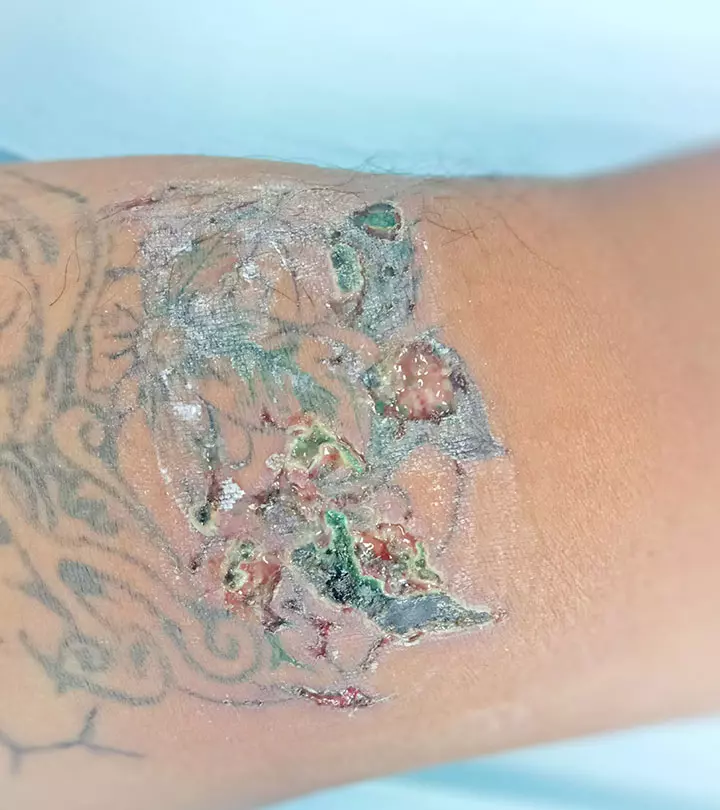
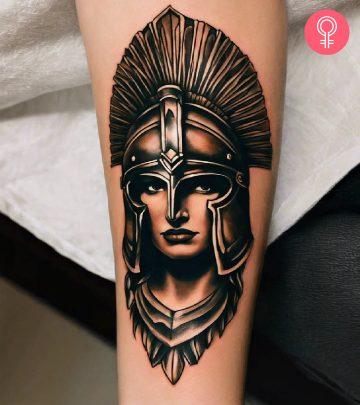
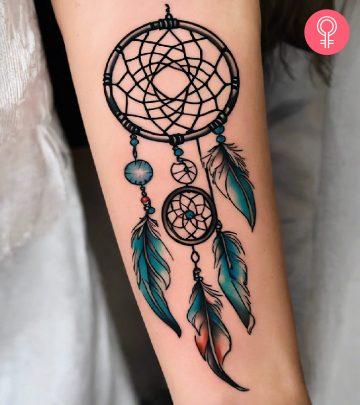





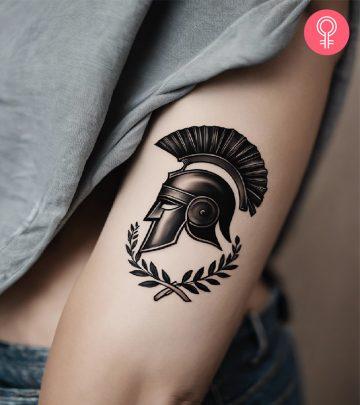




Community Experiences
Join the conversation and become a part of our empowering community! Share your stories, experiences, and insights to connect with other beauty, lifestyle, and health enthusiasts.